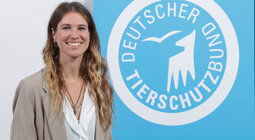At the start of the carnival season, the German Animal Welfare Federation points out that parades are a major stress factor for horses. The stricter guidelines in North Rhine-Westphalia (NRW), which come into force this year for the use of horses in carnival parades, do nothing to change this. In contrast, Bonn's decision to organize the Rose Monday parade without horses for the first time is exemplary.
“We welcome the fact that NRW has at least addressed the problems associated with the use of horses at carnival and is imposing stricter regulations. However, noise, crowds and flying litter still represent a considerable stress factor for the flight animals. Training can only help to a limited extent in preparing sensitive horses for such events. Basically, one should ask oneself whether traditional reasons alone justify exposing horses to such stress. It must be evaluated afterwards whether the guidelines have improved the situation at all,” says Andrea Mihali, expert for horses at the German Animal Welfare Federation.
The federation is calling for the use of horses to be completely avoided in future, as is the case in Bonn. In addition to animal welfare aspects, the incalculable risk for carnival revellers on the roadside also plays a role. In 2018, five people were injured during the Rose Monday parade in Cologne - four of them seriously - because horses from a carriage ran through. The year before, an accident occurred during the Bonn parade. A team of horses and carriage took off uncontrollably and collided with parked cars, among other things.
THE BIG PARADES RESTART AFTER A FOUR-YEAR BREAK
For the first time since the start of the coronavirus pandemic and the war in Ukraine, the big Rose Monday parades are taking place again - often with horses. In North Rhine-Westphalia, new rules have been introduced based on guidelines issued by the North Rhine-Westphalian Ministry of the Environment, Agriculture, Nature Conservation and Consumer Protection. Among other things, it must be possible to remove horses at several points along the route of the procession. A vet must be able to be on site within ten minutes. In addition, horses should only be positioned at the beginning or end of a procession if possible - not near a band. At least one person must accompany the accompanying horse. In the case of a team of carriages, at least four carriage attendants are also required. Alcohol and other drugs are taboo for anyone involved with horses during the procession. In addition, horses must be regularly prepared for use and accustomed to “special stimuli specific to the event”, such as projectiles, fluttering ribbons or bands.
CARNIVAL ALSO MEANS STRESS FOR DOGS
Not only for horses, but also for dogs, carnival can quickly become a stress factor. The German Animal Welfare Federation therefore appeals to all animal lovers not to put their four-legged friends in a costume or take them to a street carnival or meeting. The crowds and noise can cause stress and fear. Throwing projectiles, broken glass and sweets that are poisonous to dogs are also serious sources of danger.





